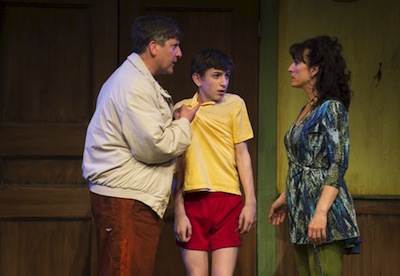Nolan Fahey plays the title character in Arts Club’s Billy Elliot. (photo by David Cooper)
There are no big surprises in Billy Elliot, no bizarre twists or jaw-dropping turns of events, no mistaken identities or star-crossed lovers. But what you do get is class struggle, a feel-good story and exceptional singing, dancing and acting all with high-octane energy from start to finish.
Given that the musical is based on the 2000 movie of the same name, most people will already know the story. But even if you haven’t seen the film, you’ll likely figure out beforehand that Billy Elliot traces a coming-of-age-dusting-off-the-dirt-of-this-town tale of a young boy wanting to be a dancer. He sees an audition in London as a way out of the coal-mining misery that has made up the lives of his father and brother.
Living in England’s County Durham, 11-year-old Billy stumbles across a ballet class when he’s supposed to be taking boxing lessons. The 50p his father gives him to learn jabs and upper cuts goes instead to Mrs. Wilkinson to teach him pliés and pirouettes.
Meanwhile, his father, brother and neighbors, part of the National Union of Mine Workers, are struggling to make ends meet as they head out on strike protesting the closure of the coal mines during Margaret Thatcher’s reign in the 1980s.
The contrast of the gruff, angry, mob-like miners, the police at the picket lines and the young girls and Billy in their dance outfits illustrates how far apart their worlds are. One of the best dance numbers brings these three groups together to sing “Solidarity,” with the ballet dancers flitting in between the rows of men as they stomp about the stage.
As Billy moves between these two worlds, he has to conceal his desire for dance, for fear of reprisals and embarrassment.

When Billy’s father – played by Jewish community member Warren Kimmel – finds out where his son has been spending his afternoons (and his money), he’s furious. Even though Billy’s teacher thinks her young student has a chance to get into the Royal Ballet School, Billy’s family has other plans.
In the end, Billy’s dad has to choose between earning money as a scab in order to send Billy to his audition, or support his brothers on the picket line.
Throughout the play, the scenes shift between the lighthearted dancing and the sombre mood in Billy’s home and on the picket line. With Kimmel front and centre as Billy’s father, his despondent singing is evocative of his performance of the policeman Javert in Les Misérables last year and, indeed, the storyline – and songs – of class struggle in Billy is reminiscent of the same in Les Mis.
On the dancing side, Billy has touches of the studio work and audition of Flashdance and the off-the-wall anger dancing of Footloose, while tap-dancing men in drag bring a bit of humor to the show.
All in all this play flies by. The level of performance of Nolan Fahey as Billy, Caitriona Murphy as the dance teacher Mrs. Wilkinson and Kimmel as the dad, along with a strong cast that can shuffle and slide as well as they croon, makes this a standout production.
Billy Elliot – with music by Elton John and lyrics by Lee Hall – debuted in London’s West End in 2005, garnering critical acclaim, winning four Laurence Olivier Awards in London, followed by 10 Tony Awards in New York.
The work is not John’s first foray into musical theatre. In the 1990s, he and Tim Rice collaborated to produce the soundtrack for The Lion King, for which they won Academy and Tony awards, including best musical. Then, in 2000, they collaborated on Aida, which won them each a Grammy.
Billy Elliot runs at the Stanley Industrial Alliance Stage until July 10. Tickets can be purchased from artsclub.com. Parents wanting to take their kids should note that the show includes a lot of swearing.
Baila Lazarus is a freelance writer and media trainer in Vancouver. Her consulting work can be seen at phase2coaching.com.

